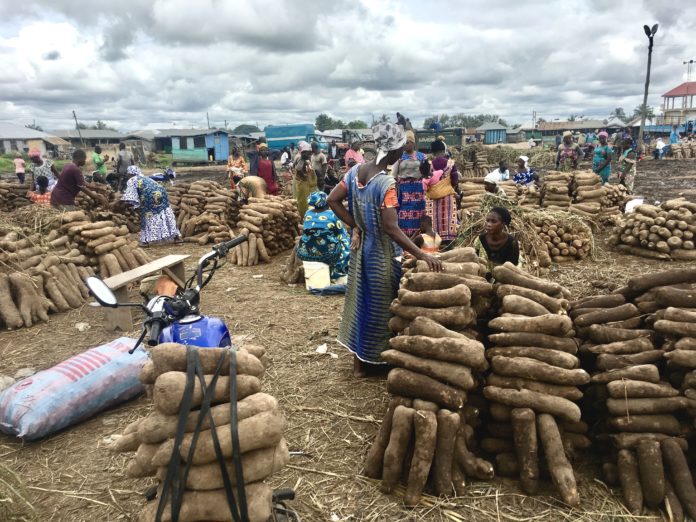The global Pandemic; COVID-19 continues to battle various sectors of our economy not sparing the agriculture sector, which happens to be the backbone of Ghana’s economy. Agriculture which provides employment for approximately 60% of Africa’s population has been adversely affected by the pandemic.
As nations lockdown, place ban on public gathering, restrict movement, reduce the number of people in market centers and close their borders, it is undoubted that these measures have and will at all times affect food production and availability in diverse forms if contingent strategies are not put in place.
This comes to buttress the projections of the United Nations Economic Commission for Africa (UNECA), which says Africa’s GDP growth is likely to drop from 3.2% to 1.8%. This is essential to prove that there is a likelihood of an increase in the number of people living in extreme poverty and hunger in Africa.
COVID-19; the ravaging virus, though a health crisis, has indirectly ameliorated our food crisis. The current happenings have offered us the opportunity to clearly see in another dimension on how food in many ways is linked to health.
Apparently, the widespread of the virus has significantly tested and challenged three major areas of Ghana’s agriculture, thus, our production systems, our supply chain, and our food commodity preference.
Production Systems.
The majority of our farmlands are under rainfed agriculture and hence the time to undertake some crucial farm activities is done side-by-side with information on weather conditions and seasonal dates. For example, time to plough and plant are done timely so that farmers do not miss the season. It is rather unfortunate that the lockdown which restricted movement has immensely affected the availability of farm inputs and other farm services since rural farmers could not access city centers and tractor service providers were faced with challenges accessing spare parts and other mechanical repair services. This situation of inferably has discouraged a number of poor farmers who don’t want to take the risk of late planting. Among some youth farmers, the conventional decision is to do few acreages in the major season in anticipation to do more acreages in the minor season probably when normal activities resume.
The poultry industry which already needs pragmatic support to be able to pare the high importation of frozen chicken into our country hasn’t been exempted from the adversities. Aside from the difficulty associated with getting imported day-old chicks, feed ingredients such as soya bean meal, wheat brand and layer/broiler concentrates (most of the imported source) are gradually becoming hard to find and the few available have their prices hiked.
To date, registered farmers on government flagship programmes like Rearing for Food and Jobs (RFJ); a policy to revamp the poultry industry, are still waiting on the Ministry of Food and Agriculture (MOFA) to deliver as stipulated by the policy. The Ghana Agriculture Sector Investment Program (GASIP); the major promoter of Youth in Agriculture is yet to supply its 2020 season first batch of inputs to youth FBOs (Farmer Base Organizations) who are immeasurably benefiting from this life relieving programme even though the first season is about half spent.
The Ministry of Trade and Industry in collaboration with Rural Enterprise Program, IFAD, and 58 selected District Business Advisory Centers are on the verge of executing 58 agro-processing industries under the Youth in One District One Factory initiative. The selected candidates for this project who are supposed to take four (4) months mandatory business training are currently on hold as the ban on public gathering remains. These and the likes have affected food availability and have the tendency to polarize food security post-COVID-19.
Supply Chain.
The food supply chain provides a lot of jobs for transport services and women who purchase from farmgate and sell to retailers in our towns and cities. When the government propounded restriction on movement and deployed military personnel into towns and cities to enforce the partial lockdown, the activities of food supply chain actors were precluded. This has negatively affected the already frail rural-urban food network as fewer middlemen moved into farming communities to buy.
The drastic reduction in the number of fresh food retailers in our markets and the decision of some managers to close down restaurants, hotels, and other local eateries has reduced the bulk purchase of fresh foods massively.
Subsequently, a pretty good number of women suspended the carting of fresh foods from rural communities due to fear of spoilage from the slower pace observed in the purchasing of fresh foods.
Whilst low income earning individuals stay at home adhering to precautionary measures, this has affected the income of families as well as their purchasing power. Owing to the poorly managed food supply chain, price hike set in, and that deterred majority of people from buying fresh foods. A typical scenario is where people will buy a tomato paste which has relatively not increased to price than to buy a fresh tomato under a price hike.
For animal farmers like those in the poultry industry, festive seasons are the moment for their peak market. Unfortunately, 2020 Easter did not give poultry farmers the spotlight they always receive. The ban on public gathering, social ceremonies and families reduce visitation to relatives, and all other activities rounded in the celebration of Easter gets boycotted, the market for animal products has equally dwindled.
The next batch of farmers to be hit by similar misfortune is ruminant farmers if conditions still persist throughout Ramadan. The resulting price that farmers may have to bear is an increase in the number of mortality and high cost of production as they must continue to feed and manage their animals until they are plugged in the latter days.
Food Commodity Preference.
In the midst of all these opened challenges, there’s still a hidden threat to our food system. During this period, institutions, organizations, and individuals gave charitably to needy families. One paramount thing observed was that approximately 60% to 70% of the food package shared was food from imported sources rather than local fresh foods taking mega portions. This is a great dysfunction to farmers who produce local fresh foods at any point in time.
Surprisingly, people now prefer sardine or imported canned fishes to fried fishes from our fishery sector. Rice is now chosen over corn which has not increased in price by just a pesewa and still remains a food crop eaten across all ethnic groups in Ghana. It is very obvious that our unprecedented taste for foreign foods like rice if not curtailed can propel the collapse of our food system. For most low-income earning families, the interest is not in the rising number of COVID-19 cases but unrest as hunger hit their homes.
Proactive measures.
Before we hit the rock bottom as a nation, we admonish government agriculture policymakers to focus on extensive investment into our farming system to make them more resilient. These measures and already existing policies and programmes should be attended to with all proactiveness than turning a blind look at them while all our attention has been focused on the virus.
There is equally the need for financial support for farmers in the form of interest-free loans with a long payment period to cushion farmers from the business shocks they are experiencing in this trying time. In order to reduce food wastage, a hefty investment in food processing is earnestly needed to save food and put food in the forms most preferred.
Farmers on the other hand as a form of alimentation to government effort must establish and develop their input and food supply network. They must learn to build trust with customers and input dealers such that there would not always be the need for in-person contact before a business can be transacted. Youth agripreneurs can leverage this opportunity to develop innovative platforms that connect agriculture value chain players to engage in business without in-person contact.
Nevertheless, the entire citizenry should with immediate effect truncate our uncontrolled taste for imported food and patronize fresh foods cultivated by our gallant farmers. We must be well informed that our choice of food commodities invariably has an effect on the economy at large.
In the end, we must always know that there has not been a time like now that we ought to eat more of what we grow and grow more of what we eat. These and other proactive measures can catapult us into a more food secured state than to usher our nation into extreme hunger post-COVID-19.
By; SAMUEL ABROQUAH.








